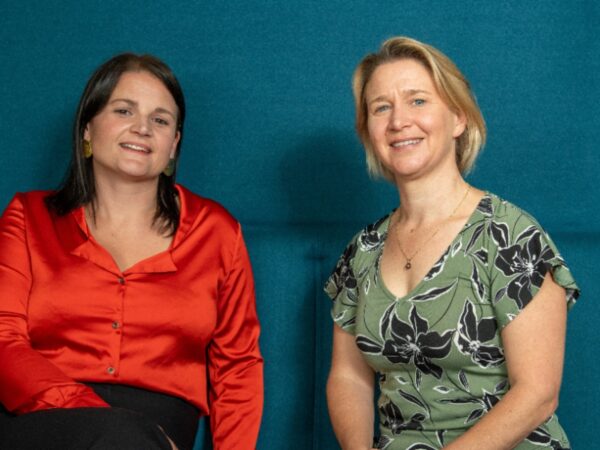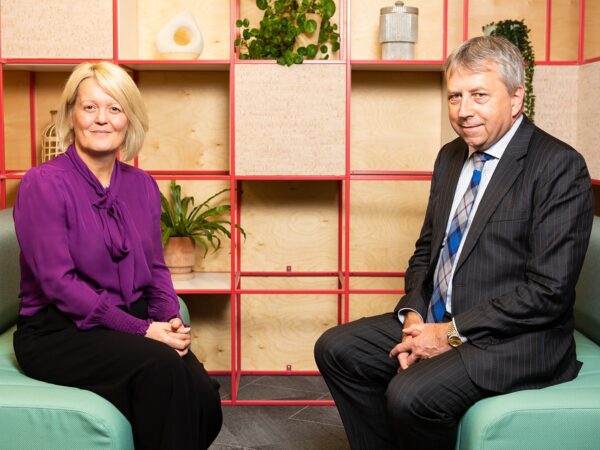

Quantum computing promises to be a game-changer for financial
services and is developing rapidly. Strategic partnerships are helping
industry needs and academic research to keep pace with one another. One
such successful collaboration is between Edinburgh Futures Institute and
NatWest Group.
In this podcast, host Kim
McAllister discusses the strategic partnership between NatWest and the
Edinburgh Futures Institute (EFI), exploring the role of quantum
computing in fintech.
The collaboration helps NatWest integrate cutting-edge academic insights into practical business applications, benefiting both organisations and offering broader societal advantages.

Tobi Schneider, fintech lead at Edinburgh Futures Institute, emphasises the value of this academia-industry partnership in bridging research and practical applications, especially in data-driven innovation.
Phoebe Choi, strategy and innovation associate at NatWest Group, highlights how their project on quantum machine learning deepened understanding, inspired colleagues and will lead to developing new products and services.
Professor of Quantum Computing at Edinburgh's School of Informatics, Chris Heunen, explains quantum computing’s fundamental differences from classical computing and its potential for solving specific problems faster.
Listen to learn more (opens in a new window)
Transcript
Introduction
Phoebe Choi: This case study, is a prime example of enabling knowledge sharing, ensuring that quantum experts can speak the banking language, and that our colleagues who speak the banking language know a little bit about quantum as well.
Tobi Schneider: But we also have something in the public sphere now where people can actually read about quantum technology for financial services and fintech, and also understand what it means and what the applications are. But more importantly, or equally important, at least, what are the limitations?
----
Kim McAllister: Quantum computing is a complex area that’s developing rapidly. In order for Industry needs and academic research to keep pace with one another, strategic partnerships have to form where each learns to speak the other’s language. NatWest and the Edinburgh Futures Institute (EFI) have established just such a partnership, with very successful outcomes.
This is just one example of the impact that funding from the Data-Driven Innovation initiative can have. I’m Kim McAllister and I talked to Phoebe Choi from NatWest, Quantum Computing Professor Chris Heunen and Tobias Schneider from the Edinburgh Futures Institute to hear more.
----
Well, welcome everyone, and thank you for joining me on this podcast. I would like to start with some introductions. So, Phoebe, would you like to start by introducing yourself?
Phoebe: I’m Phoebe Choi and I’m part of Innovation and Partnerships here at NatWest. Our department is all about co-creating the future of banking with partners and we want to know what’s happening in the external technology landscape and we want to align that to our own internal strategy as well. And hopefully, from there, we can then use that content to inspire our colleagues. But not only that, to then actually develop new products and services for our customers as well.
Kim: Thanks, Phoebe. Great to have you with us, and Chris.
Chris Heunen: Hi, Kim. Thank you. My name is Chris Heunen. I’m a Professor of Quantum Programming at the University of Edinburgh. So that means I teach students about quantum computing. I research quantum computing, and that also means that I work with Industry partners on various projects and this is one of them that we’ll be talking about.
Kim: Great. I’m looking forward to you explaining the mysteries of quantum computing, and Tobi.
Tobi: Yeah. Hi, Kim. Hi everyone. My name is Tobi Schneider. I’m the Sector Engagement Lead for Financial Services and FinTech at the Edinburgh Futures Institute. This means I sit in between the academics and Industry and do a lot of translational work to make sure our academics understand what Industry is looking for, but also to make sure Industry understands what capabilities and capacity we have across the University to support Industry with all kinds of challenges, including quantum computing.
Kim: Great. So we’ve got the perfect people to chat with today. You’re going to tell us all sides of this story. I’d like to start by just a general understanding of what quantum computing actually is and how it refers to fintech. So, Chris, if you wouldn’t mind just simplifying it for those of us who aren’t quite so familiar with your work.
Chris: I’ll try my best but maybe give me a break because sometimes it’s not easy to understand. Let me have a go anyway.
Quantum computing is where you use nature to solve problems for you. So typically in a classical computer you use nature in the form of electricity or electrons that have a certain voltage as either a zero or five, and then bits can be zero or one. And depending on that you can compute with those bits.
So, quantum computing is a bit different because the things that carry the information are no longer electricity, but they are very much smaller, which means that they obey the rules of quantum mechanics rather than Newtonian mechanics, classical mechanics, and then weirder stuff starts to happen and nobody really understands it. But the nice thing about it is we can use this weird stuff to solve certain problems much faster than any classical computer can practically do. Does that make sense?
Kim: It does, yes. I’m following so far. So it would be great to bring you in then, Phoebe, at this stage, because obviously NatWest has fantastic reach and I’m sure this is very interesting to you. What specifically are you working with Chris and the team on?
Phoebe: So, the project that we worked on was to review the quantum machine learning landscape. If I take that back one step. There are three main areas where we say quantum technologies can impact financial services. So, the first one is around optimisation. Second is information security, and then [third] we’ve got machine learning and we decided to focus on that area because this was one of the spaces that we have awareness of, but we wanted a deeper understanding of.
That’s why we collaborated with the University of Edinburgh and academics like Chris and others, to understand the landscape a little bit more, understand what the promises and limitations are for this capability, and how far out we might be in terms of realising the value of this technology as well.
Kim: Fascinating. And Tobi, I guess from your point of view, it’s just a delight to put these two parts of the puzzle together, because I imagine NatWest doesn’t have that power in-house. And likewise, Chris isn’t necessarily thinking specifically in fintech. So, it seems like a good mix.
Tobi: Right. Yeah, it’s a perfect mix and it fits right into what we want to do in the partnership between NatWest and the University of Edinburgh. So, we’re looking a lot at data-driven innovation as part of the partnership. Quantum computing is one of the examples. We also do projects on artificial intelligence, on climate modelling… There’s a whole range of topics we’re working on and this fits right in.
I think one of the benefits of working with the University rather than consulting firm is that you not only get cutting-edge research – so the latest in what’s happening in the research field – but also a very unbiased opinion on what is possible and what is not possible. If you go to a consulting firm without, you know, giving any offence to anyone, sometimes [there is] a bit of a skewed bias towards certain opinions because it helps certain commercial outcomes, whereas the University is much more unbiased and neutral in our approach.
Chris: If I can add a bit to that. Quantum computing is typically a field seeing a lot of hype. It has been around for a long time, let’s say from the ’80s at the very least. There’s been a lot of hype around, oh, this is going to solve all our problems, but of course it’s now not the ’80s anymore and not all our problems are solved, so not all of that turned out to be true. So, since the initial hype has gone down a bit, people have been a bit wary about, you know, should we really get into this? Is it really worth it?
But in the last, I’m going to say, decade, maybe 15 years, a lot of money has been piled into this and the hardware is now coming along to the point where you can just go out, not quite to the shop, but go out and buy your machine and it will do stuff well. It’s really industrially in use. So this is a good time for partners like NatWest to wonder “Should I get into this game? Should I get prepared?” and then, as Tobi was saying, the University takes a scientific point of view. So, we’re really into it to prepare society and prepare a workforce to make this technology happen. Whereas if you talk to hardware vendors, for example, of course, they also have lofty goals in mind, but they also need to sell their stuff, so you might get a different colour viewpoint.
Phoebe: I can definitely vouch for that having been in on this engagement. It is definitely a different type to some of the other partners that we work with. I think as an organisation it’s important to keep that balance in terms of working with academics, but also other partners as well.
Kim: So how do you see this collaboration growing then, Phoebe?
Phoebe: In terms of how I see this collaboration growing, I think, quantum machine learning is just one aspect of it. But as I mentioned earlier, there are other areas as well. And on top of that, there is also the software and hardware side of things.
Let me give an example [using] our phones…Our phone itself is the hardware. The device runs on software such as iOS or Android, and these devices typically have voice assistants or other applications that run on algorithms. If we translate that back to quantum, it makes sense to assess the entirety of the landscape. You can’t just say “Oh, we’ve looked at machine learning. That’s it. We don’t need to look at anything else.” No, it doesn’t work like that. You have to make sure you build that holistic view. I see the collaboration heading that way as, together, we can find the right building blocks to prepare NatWest and this helps to bridge the gap between real business applications and academic research. And by an iterative and continuous engagement, we can steer research in the right direction.
Kim: This is fascinating. Tobi, I suppose this is music to your ears. This is exactly what EFI is hoping to achieve, right?
Tobi: Yeah, correct. That’s exactly what we are here for. We want to be part of the change that happens in Industry. We want to provide insight into what’s happening, but from a very scientific base point of view. We want to cut through the hype, as much as possible, and we want to support organisations in growing their technology, their data-driven approach, as much as possible. And it’s not a one-off from our point of view, because this field is changing so rapidly. In order to stay ahead of what’s happening in research, I think it’s very beneficial for organisations such NatWest to partner up with a university like the University of Edinburgh. We can support them through their journey, with our insights and our research.
Kim: And, Tobi, this is a typical example of Industry working with academia or is this quite unusual?
Tobi: It is usual and unusual at the same time. So let me start with the usual. We have a range of Industry partners with which we work on different projects. Many of them are technology related. Obviously, AI is a big hype. Quantum computing is a big hype. There are other topics that are on everyone’s mind like climate change…
What makes NatWest different to many of the other partners is it’s a very strategic partnership; it’s not a one-off project…There’s a whole portfolio of different things we do with NatWest as a group. It includes research, and I mentioned some of the topics we’re doing with them. It’s also a lot about, you know, bringing students to the NatWest campus to show them what NatWest is doing. It’s inviting NatWest colleagues to speak at University events or forums. It’s creating events together with NatWest. It’s a very, very broad and a very deep partnership. And it’s significantly more strategic than others we have at the University. So it’s usual in the sense the project is not unusual for us to work with Industry, but it’s unusual that it’s a very broad, very deep and very strategic partnership.
Kim: That’s great to hear. And, Phoebe, I suppose from your point of view, you’ve been involved with the work, but do you think it would have been possible to achieve your goals if it were a different partner? Do you think it would have been more complex or…what’s your view on that?
Phoebe: I think this collaboration for us has been pretty impactful. I’d say for the partnership we were connected with different academics that had different specialisms and expertise and even you know throughout the engagement we talked about other forms of compute beyond quantum as well, so that really complemented this piece of work, and it’s something that’s also on our radar.
This collaboration is definitely, as Tobi mentioned, one of many between the University and NatWest. But a review paper of this kind is a massive endeavour, and it takes effort from both the academics themselves, and also our in-house data scientists. It’s a great piece of work and it will be a great springboard for other professionals and financial services or other researchers to go off and discover more in this field. So, although I managed the engagement on behalf of NatWest, I’d just love to take this opportunity to congratulate all the authors that were involved.
Kim: That must be nice to hear, Chris.
Chris: It is, because the University is also getting something out of this partnership, of course. It’s not just that we advise and do stuff for NatWest…Let me zoom out a bit, and say that we run something called the Quantum Software Lab which is the largest of its kind in the UK and its focus is mostly on software and applications of quantum computing. So historically, quantum computing has mostly been the purview of physics and engineering, and building the hardware. But as I was saying earlier, the arms race is now shifting to how can we use this hardware in a useful way, in an impactful way. So now it’s more about how do you write software for this kind of hardware and how do you actually translate, for example, NatWest’s problems that they computationally have into these kinds of quantum programmes? And for that is not just an academic exercise, right? The point of finding out what is useful in practise means we have to go out into practise and see what people want to do with this kind of computer. And that’s what the University is getting out of this kind of partnership.
Phoebe: Just to add to that, I think from an innovation perspective, and particularly with emerging technology as well, there is always that knowledge-sharing piece that comes before doing something practical. And I think this partnership, especially this case study, is a prime example of enabling knowledge sharing, ensuring that quantum experts can speak the banking language, and that our colleagues who speak the banking language know a little bit about quantum as well.
Kim: Yes, and very clever people they are too. It’s a fascinating project. Tobi, you must be very pleased that it’s been so successful.
Tobi: Yeah, we are massively pleased. As you can hear from Phoebe and Chris, they both enjoyed working on it. I think the whole team enjoyed working on it.
A couple of weeks ago we had a bigger presentation of the output of the project to [many senior stakeholders from NatWest and the University], and the feedback throughout has been extremely, extremely positive.
The paper that was just mentioned[…]is already published so there’s a tangible output from this project in the public space, which is great because, obviously while it’s a project between the University of Edinburgh and NatWest, […] we want to share our knowledge for wider societal benefit. I think that’s one of the great examples of this project is it not only benefits both organisations […]but we also have something in the public sphere now where people can read about quantum technology for financial services and fintech and also understand what it means and what the applications are [and] what the limitations of technology currently are. So, we’re extremely pleased with this partnership and specifically with this project.
Kim: Well, so Chris, where is […] it published and where is it available?
Chris: You can go right now onto the Internet and read it on a preprint server called the Archive, because that’s the way things work in science. You put out a preprint first and then you find a venue you to do the publishing, and we’re looking for that venue at the minute.
Kim: Great. Well, that sounds fascinating. And thank you all three of you for joining us. Thank you, Phoebe, Tobi and Chris.


